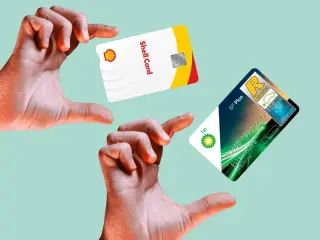
Shell and BP are two of the biggest fuel brands in the UK and they each offer a selection of fuel cards which are designed to streamline operations and maximise savings. With expansive networks and competitive prices for petrol and diesel, their fuel cards are a popular choice for businesses.
Although Shell fuel cards and BP fuel cards offer many of the same benefits, they have key differences, including where they can be used and how much you’ll be charged. Understanding these nuances will help ensure you find the Right Fuel Card for your business.
Benefits and features of Shell and BP fuel cards
Shell and BP both offer 3 different fuel cards, which fleets can use to save money and time. Their fuel cards can be directly compared:
Shell | BP |
|---|---|
|
|
|
|
|
|
BP and Shell fuel cards can be used as payment for petrol, diesel, and even electric vehicles, making them the ideal choice for mixed fleets. Their networks are expansive, and include petrol stations with high canopies, benefitting HGV drivers.
Regardless of whether of you choose a Shell or BP fuel card, all transactions will be displayed on one invoice which you can access through our online account management system. This means you no longer need to keep hold of receipts and you can easily reclaim VAT that’s owed to you.
Shell and BP also have a range of card security features, including unique PINs and spending limits, so your business will be protected from fuel card fraud.
Network coverage
Shell and BP have expansive fuel and EV networks. Drivers can access thousands of petrol stations and EV charging points across the UK, using their fuel card as a convenient payment solution.
You can find your nearest petrol station through our site locator app. For EV chargers, please go to the Shell or BP site locator, depending on your EV charge card.
Shell and BP fuel networks
With access to over 3,900 sites, Shell fuel cards have a slightly larger fuel network than BP. However, with a network of over 3,400 sites, BP still offer excellent coverage across the UK.
Shell and BP fuel cards can be used at their own motorway sites, making them a practical choice for drivers that travel nationwide. Depending on the card, you can also refuel at hundreds of third-party sites, including Texaco, Esso, and Gulf (surcharges apply).
For greater accessibility, the Shell CRT and BP Bunker fuel cards are designed specifically for fleets with HGVs. Most fuel stations that accept these cards have truck friendly facilities, such as high canopies and dedicated parking.
Shell and BP EV networks
Shell and BP each have their own EV networks and EV charge cards. Their networks are Shell Recharge and BP Pulse.
Drivers only need to download one app (Shell Recharge or BP Pulse, depending on your EV charge card) and payments are contactless, simplifying the recharging process.
Both EV networks have fantastic coverage across the UK with over 23,000 EV chargers and 35,000 EV chargers respectively. They include fast, rapid, and ultra-fast charging points, so drivers can conveniently recharge whilst on the move.
BP have a clear size advantage over Shell in terms of their EV network coverage. With the BP Fuel and Charge card, you can access both the Shell Recharge and BP Pulse network, plus Osprey, Ionity and more. So, if you’re looking for the most convenient EV payment solution, BP is probably the superior option.
Pricing structures
If saving money on fuel is a priority for your business, then we’d recommend one of our fixed price fuel cards. They have competitive rates for diesel and can save you money on fuel. To help you keep track of what your drivers are spending on fuel, you’ll receive weekly price notifications by text or email.
Although they operate on similar pricing structures, our BP fuel cards do tend to be cheaper for petrol and diesel than Shell. However, this can change depending on movements in the market.
For EVs, charging prices are similar for the Shell Fuel and EV and BP Fuel and Charge cards as you’ll pay the retail price. With these cards, drivers will pay a transaction fee, and this can differ between Shell and BP. Unlike Shell, BP also have an overstay fee which you’ll be charged after 90 minutes of charging.
Fuel quality
When comparing the fuel quality of Shell and BP, both companies are renowned for their high standards and advanced fuel technologies. Shell V-Power and BP Ultimate are premium fuels which are designed to clean and maintain engine health. This enhances performance and improves fuel economy, saving you money in the long run.
Ultimately, the choice between Shell and BP fuel often comes down to personal preference and accessibility, as the quality of their fuel is relatively equal.
Fuel card reward programmes
In addition to cheaper fuel, drivers can utilise Shell and BP’s individual reward programmes. Every time you refuel, you’ll receive points, and these can be exchanged for discounts and rewards. This benefits drivers on the move and helps them save money on their daily purchases.
Shell GO+
Drivers using a Shell fuel card can benefit from the Shell GO+ reward programme. This includes:
|
|
|
BPme
The reward programme for BP fuel cards provides many benefits to drivers, including:
|
|
|
Pros and cons of BP and Shell fuel cards
When deciding between a BP and Shell fuel card for your business, it’s important to carefully consider the benefits and drawbacks.
As every business is different, your requirements will vary, and you may be better suited to one brand over the other. So, we’ve collated the pros and cons for BP and Shell fuel cards to help inform your decision.
Shell | BP |
|---|---|
Pros of Shell fuel cards
| Pros of BP fuel cards
|
Cons of Shell fuel cards
| Cons of BP fuel cards
|
The similarities between these business fuel cards are clear, and they can both offer benefits to your fleet. It’s likely that location and price will have the biggest impact on whether you choose a Shell fuel card or a BP fuel card, as this is where they differ most. However, you could use a fuel card from both brands if you wanted maximum coverage and flexibility.
Explore our guide to Shell fuel cards and our guide to BP fuel cards for more information. Alternatively, you can contact our friendly team to discuss your options further. You can also compare our range of fuel cards to help you determine the Right fuel card for your business.




